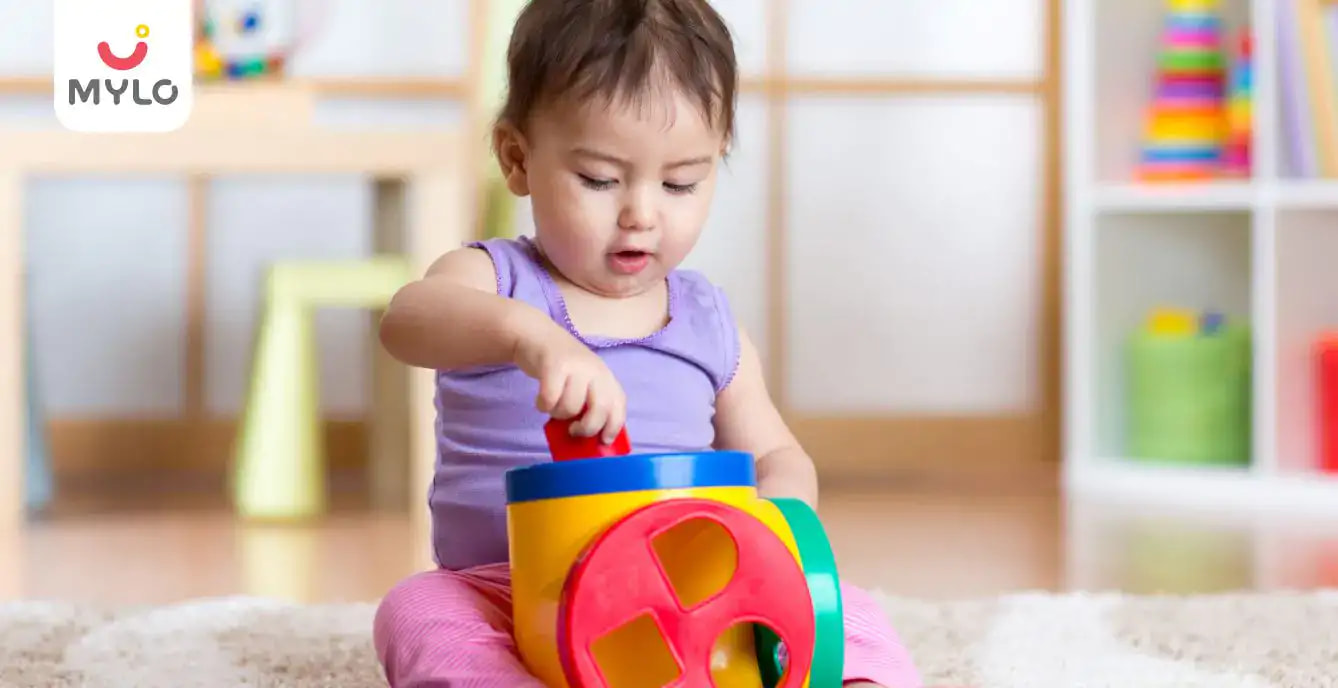Home

Growth & Development

Tips & Activities to Boost Baby Brain Development
In this Article

Growth & Development
Tips & Activities to Boost Baby Brain Development
Updated on 3 November 2023
Einstein is what all mums want their children to turn up into but how to storm that little brain at work? A baby’s maximum mental progression happens during the first five years of life. So, gear them up as soon as possible and play a pivotal role in your baby brain development.
In this article, we will discuss some extremely helpful activities that you can do with your baby to support the baby brain development by month.
You may also like : Baby Brain Development Food
Activities for Baby Brain Development By Month : 0-3 Months
Here are some magical handy tips parents can try to boost their baby's brain development from 0 to 3 months:
1. Read and talk
Mommy must schedule reading time for the baby using soft picture books with small words. Also keep talking during bath time, change or feed with strong eye contact. But keep shuffling the books/topics else the baby gets bored and becomes fussy.
2. Bring the rainbow down
It is wonderful to improve focus by having a mobile (Merry-go-round) with high-contrast patterns hanging above the changing table, floor gym, or the crib.
3. Sense it all
Bright colours, moving toys, touch, and react toys are excellent props to stimulate your baby’s developing senses and sensory development. You can also respond in certain ways to your baby’s touch or sound to make him/her practice.
Activities for Baby Brain Development By Month : 3-6 Months
Here are some magical handy tips parents can try to boost their baby's brain development from 3 to 6 months:
1. Mama or Dada
It is an appropriate time to familiarise your baby with small and often used words like mama, dada, good-bye, etc. So he/she can listen and relate like a car or a bird.
2. Bob the builder
Bring the baby together with blocks and stacking toys to expand his/her creativity and understanding as well as focus.
3. Mirror mirror on the wall
You can place an unbreakable mirror beside the baby during their play or massage time where they can look, wonder, and explore more about themself.
Activities for Baby Brain Development By Month : 6-12 months
Here are some magical handy tips parents can try to boost their baby's brain development from 6 to 12 months:
1. Sound mystery
You can fill the toy box with varied materials like wooden blocks, metal toys, and plastic blocks to make the baby bang them on hard surfaces to understand the fact that different things make different sounds.
2. Reason and result
Let your baby's little brain flourish by experiencing the cause and result theory. For instance, if he/she makes a block tower and bumps into that it falls and makes noise.
3. Word bank
Introduce the baby with more words while reading like “Red car,” “Blue bird” and “Green tree” so he/she can make a difference.
Motivate the baby to do age-appropriate activities for happy growth with playing, singing, and talking- Have Fun!
Tips to Promote Baby Brain Development
Besides doing these activities with your baby to promote their brain development, you should also be mindful of the following tips:
1. Consider responding to your child
If your baby is sad, upset, or even hungry, it is important for you to respond with some comfort. Apart from the above-mentioned three emotions, babies can also reach out to you in numerous ways. Making sounds or smiling are just some of the ways they use to grab your attention.
2. Let your baby explore their environment
Letting your child explore their environment, both inside as well as out is extremely crucial. Playing helps babies to learn numerous things at a faster pace. Considering the fact that you are your baby’s first friend and a playmate, it will be easier for your child to respond to your better.
3. Make sure your baby gets high-quality healthcare
It is important for your baby to get regular check-ups done by a pediatrician. Vaccinations can also help your baby from contracting dangerous diseases. You can consider talking to your baby’s doctor regarding what aspects to consider next.
4. Motivate your child to build connections
You can learn more about the community programs or services that are available in your region or neighbourhood. Many communities have programs to help young families bond with each other as well as interact.
5. Choose a trustworthy caregiver
If you are a working mother or cannot spend time with your child for some time, make sure to leave your child with a trustworthy caregiver. In fact, it is usually best to go for someone who will respond to a child’s emotional needs just like how you do. This will allow your child to learn as well as grow even in your absence.



Written by
Ravish Goyal
Official account of Mylo Editor
Read MoreGet baby's diet chart, and growth tips

Related Articles
RECENTLY PUBLISHED ARTICLES
our most recent articles

Diet & Nutrition
গর্ভাবস্থায় আলুবোখরা: উপকারিতা ও ঝুঁকি | Prunes During Pregnancy: Benefits & Risks in Bengali

Diet & Nutrition
গর্ভাবস্থায় হিং | ঝুঁকি, সুবিধা এবং অন্যান্য চিকিৎসা | Hing During Pregnancy | Risks, Benefits & Other Treatments in Bengali

Women Specific Issues
স্তনের উপর সাদা দাগ: লক্ষণ, কারণ এবং চিকিৎসা | White Spots on Nipple: Causes, Symptoms, and Treatments in Bengali

Diet & Nutrition
গর্ভাবস্থায় পোহা: উপকারিতা, ধরণ এবং রেসিপি | Poha During Pregnancy: Benefits, Types & Recipes in Bengali

Diet & Nutrition
গর্ভাবস্থায় মাছ: উপকারিতা এবং ঝুঁকি | Fish In Pregnancy: Benefits and Risks in Bengali

Diet & Nutrition
গর্ভাবস্থায় রেড ওয়াইন: পার্শ্ব প্রতিক্রিয়া এবং নির্দেশিকা | Red Wine During Pregnancy: Side Effects & Guidelines in Bengali
- ইনার থাই চ্যাফিং: কারণ, উপসর্গ এবং চিকিৎসা | Inner Thigh Chafing: Causes, Symptoms & Treatment in Bengali
- গর্ভাবস্থায় ব্রাউন রাইস: উপকারিতা ও সতর্কতা | Brown Rice During Pregnancy: Benefits & Precautions in Bengali
- Velamentous Cord Insertion - Precautions, Results & Safety
- Unlock the Secret to Flawless Skin: 7 Must-Have Qualities in a Face Serum
- Unlock the Secret to Radiant Skin: How Vitamin C Serum Can Transform Your Complexion
- Gender No Bar: 10 Reasons Why Everyone Needs a Body Lotion
- Unlock the Secret to Radiant Skin How to Choose the Perfect Body Lotion for Your Skin Type
- Top 10 Reasons to Apply a Body Lotion After Every Bath
- Communication in Toddlers: Milestones & Activities
- How to Improve Vocabulary for Toddlers?
- A Comprehensive Guide to Understanding Placenta Accreta
- Vulvovaginitis in Toddlers Causes, Symptoms and Treatment
- A Comprehensive Guide to Understanding Cerebral Palsy in Children
- Bitter Taste in Mouth During Pregnancy: Understanding the Causes and Remedies


AWARDS AND RECOGNITION

Mylo wins Forbes D2C Disruptor award

Mylo wins The Economic Times Promising Brands 2022
AS SEEN IN

- Mylo Care: Effective and science-backed personal care and wellness solutions for a joyful you.
- Mylo Baby: Science-backed, gentle and effective personal care & hygiene range for your little one.
- Mylo Community: Trusted and empathetic community of 10mn+ parents and experts.
Product Categories
baby carrier | baby soap | baby wipes | stretch marks cream | baby cream | baby shampoo | baby massage oil | baby hair oil | stretch marks oil | baby body wash | baby powder | baby lotion | diaper rash cream | newborn diapers | teether | baby kajal | baby diapers | cloth diapers |







